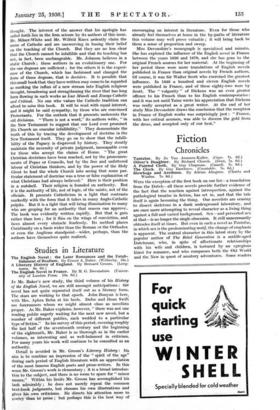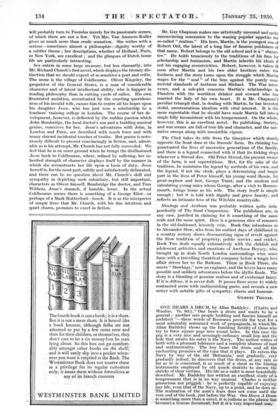Fiction
Chronicles
Windus. 7s. 6d.)
Wrrn the exception of the first book on our list—a translation
from the Dutch—all these novels provide further evidence of the fact that the reaction against introspection, against the pathological treatise in fiction, has set in, and that the tale itself is again becoming the thing. Our novelists are ceasing to dissect skeletons in a dank underground laboratory, and
are once more attempting to reveal character as a living thing against a full and varied background. Sex—and perverted sex at that—is no longer the single obsession. It still unnecessarily obtrudes itself at times. But even in such a novel as Tantalus, in which sex is the predominating motif, the change of emphasis is apparent. The central character in this latest story by the popular author of The Rebel Generation is a middle-aged Dutchman, who, in spite of affectionate relationships
with his wife and children, is tortured by an egregious thirst for romance, and who compasses both the Old World and the New in quest of amatory adventures. Some readers
Will probably turn to Tantalus merely for its passionate scenes; bf which there are not a few: Yet Mrs. Van Ammers-Kuller gives us much more than crude sensation. She writes with a serious—sometimes almost a philosophic—dignity worthy of a subtler theme ; her descriptions, whether of Holland, Paris, for New York, are excellent ; and the glimpses of Dutch home life are particularly interesting.
Sex enters in some large measure, but less clamantly, into Mr. Richard Church's first novel, which displays the literary dis- tinction that we should expect of so sensitive a poet and critic. The scene is the village of Coldbourne. Oliver Kingsley, the proprietor of the General Stores, is a man of considerable character and of latent intellectual ability, who is happier in reading philosophy than in cutting yards of calico. His own frustrated ambition, accentuated by the exacting querulous- ness of his invalid wife, causes him to centre all his hopes upon his daughter Jesse, who has just won a scholarship to a teachers' training college in London. The course of her de .wlopment, however, is deflected by the sudden passion which -John Bembridge, the local doctor's son and a budding musical genius, conceives for her. Jesse's adventures with John,. in London and Paris, are described with much force and with many shrewd incidental touches of truths. But genius is noto- riously difficult to present convincingly in fiction, and, admir- able as is his attempt, Mr. Church has not fully succeeded. We feel that he is on surer ground when he brings the disillusioned Jesse back to Coldbourne, where, refined by suffering, her in- herited strength of character displays itself by the manner in which she reconstructs her life upon a basis of duty. Jesse herself is, for the most part, subtly and satisfactorily delineated, and there can be no question about Mr. Church's skill and sympathy in depicting such subsidiary, but still important, characters as Oliver himself, Bembridge the doctor, and Tom Withers, Jesse's staunch, if humble, lover. In the actual Coldbourne scenes there is something of a George Eliot—or perhaps of a Mark Rutherford—touch. It is as the interpreter of simple lives that Mr. Church, with his fine intuition and quiet charm, promises to excel in fiction. Mr. Guy•Chapnian makes one artiithially unsound and quite unconvincing concession to the waning popular appetite fot so-called " realism." His hero, Martin, is the youngest son of Robert Ord, the latest of a long line of famous publishers of that name. Robert belongs to the old school and is a " charael ter." He holds tenaciously to the traditions of his firm for scholarship and humanisM, and Martin inherits his ideals if not his engaging eccentricities. Robert, however, is taken ill soon after Martin and his two older brothers enter the business, and the story-turns upon the struggle which Martin wages for the " soul " of the firm against the purely com- mercial standards of Ambrose and Michael. The War inter-
, venes, and a sub-plot concerns Martin's relationships in Flanders with the worthless drinker and coward who has married the lady of his own heart. It is Mr. Chapman's peculiar triumph that, in dealing with Martin, he has invested stolid, unostentatious idealism with vital interest. It is the more regrettable that he should have made Martin fall into a single folly inconsistent with his temperament. On the whole, however, this is an excellent novel.. Its publishing, Society, and war scenes are full of true life and character, and the nar- rative sweeps along with irresistible vigour.
The Clock takes its title from the timepiece which stands opposite the front door at the Strouds' farm. Its chiming has punctuated the lives of successive generations of the family, and there is a legend connected with it that- its ticking stops whenever a Stroud dies. Old Peter Stroud, the present owner of the farm, is not superstitious. But, for the sake of the tradition, he maintains the legend by methods of his own, and the legend, if not the clock, plays a determining and tragic part in the lives of Peter himself, • his young ward • Bessie, his great-nephew and heir, George Trant, and the modern and calculating young minx whom George, after a visit to Bourne- mouth, brings home as his wife. The story itself is simple enough ; but it is told with dignity and grave beauty, and , reflects an intimate love of the Witshire countryside. • Sky:bags and Arethusa was probably written quite inde- pendently of The Good Companions. The publishers' are, in any case, justified in claiming for it something of the same scale and the same spirit. Here is a generous slice of romance in the old-fashioned; leisurely vein. Book One introduces us to Alexander Slow, who froM his earliest days of childhood in a country rectory shows disconcerting signs of revolt against the Slow tradition 'of propriety, public service, and cricket. Book Two deals equilly eidiaustively with the childish and adolescent activities and emotions of Arethusa Boysey, who, brought up in drab North London .surroundings wins some fame with a triis,ening theatrical company before a tragic love affair drives hei to the 'Balkans. There in Book Three, she meets " Slowbags," now an engineer, and the lovers have many possible and unlikely adventures before the idyllic finale. The story is a -blending of genuine realism.and of exuberant fancy. If it is diffuse, it is never dull. It passes from scene to widely contrasted' scene with undirninishing gusto, and reveals is new writer with notable gifts of sympathy, 'charm and humour.
GILBERT THOMAS.







































 Previous page
Previous page